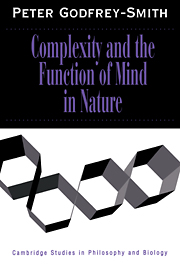6 - The question of correspondence
Published online by Cambridge University Press: 05 June 2012
Summary
The division
In the previous chapter we looked at a basic difference between Spencer's and Dewey's versions of the environmental complexity thesis: Dewey was opposed to conceptions of mind which are asymmetrically externalist. He accepted, with others of a generally empiricist temper, that thought is highly responsive to patterns in experience. But unlike Spencer and unlike more orthodox empiricist views, Dewey placed great stress on the role played by thought in the transformation of external affairs, and hence on the future course of experience. On this point I follow Dewey. But though this is, in my view, the most fundamental difference between their conceptions of the place of mind in nature, it is not the most obvious difference between them. The most obvious difference is in their attitudes to the concept of correspondence.
Spencer believed that states of mind, by virtue of their role in adapting organisms to particular external conditions, often bear a relation of correspondence to these external conditions. Dewey viewed his account of the role played by the mind in dealing with environmental problems as a replacement for the idea that the business of thought is correspondence to the external world. He saw the idea of correspondence as a typical product of a “dualist” view about mind and nature – philosophers first assert a breach or gulf between mind and the world, and then invent magical relations to overcome it.
- Type
- Chapter
- Information
- Complexity and the Function of Mind in Nature , pp. 166 - 204Publisher: Cambridge University PressPrint publication year: 1996

